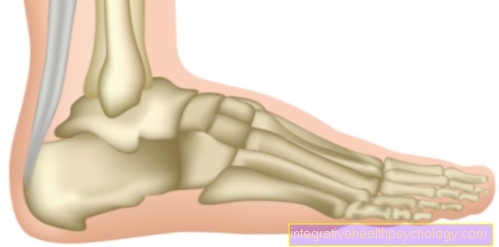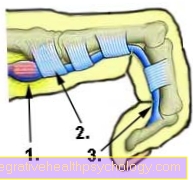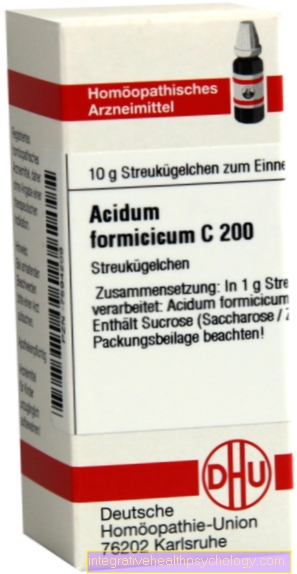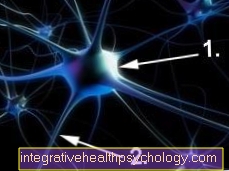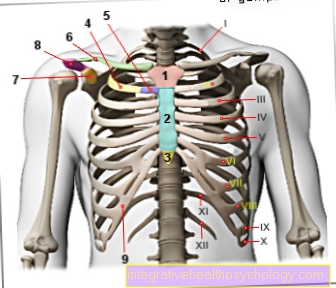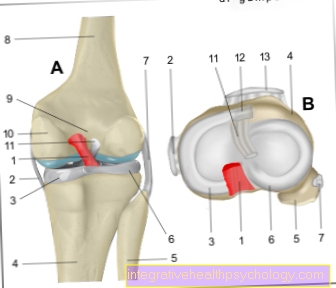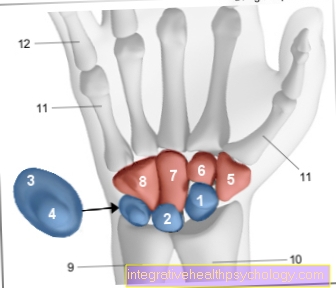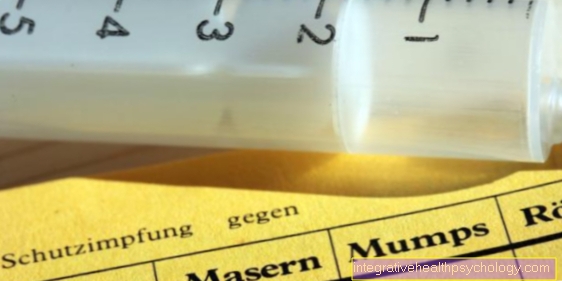Pernicious anemia
Note
You are in a sub-topic of the anemia section. General information on the topic can be found at: Anemia
introduction
Pernicious anemia is a special form of anemia. The vitamin B12 deficiency results from the lack of the intrinsic factor, which leads to anemia.
Vitamin B12 can be found in the small intestine (Ileum) cannot be included. The reason for the lack of the intrinsic factor is surgical removal of the stomach (Gastrectomy) or a regression of the gastric mucosa due to inflammation (atrophic gastritis) e.g. in the case of chronic alcohol abuse, especially in the area of the gastric outlet.

The cause can also be autoantibodies that attack the body's own structures. These autoantibodies can be directed against the cells that form the intrinsic factor (parietal cells of the stomach) or against the intrinsic factor itself.
Pernicious anemia is the most common form of anemia among the megaloblastic forms. Women are affected twice as often as men, the mean age is around 55 - 65 years. Without treatment, this form of anemia is fatal.
These symptoms indicate pernicious anemia
Pernicious anemia is initially noticeable through general signs of anemia. These include tiredness and decreased performance. Symptoms are more pronounced under stress. In addition, the skin becomes pale. This is particularly noticeable on the mucous membranes. If the anemia develops slowly, the body may adapt to the situation to such an extent that no symptoms occur for a long time.
Read more on the subject at: Symptoms of anemia
Since pernicious anemia is based on a vitamin B12 deficiency, there are other symptoms as well. The vitamin is also very important for the nerves. In the case of a deficiency, paralysis, unsteadiness of gait, abnormal sensations in the hands and feet are possible. Other neurological complaints such as impotence, bladder disorders or depressive moods can also occur. The existing inflammation of the stomach lining leads to upper abdominal pain and nausea. In addition, there are also changes to the lining of the tongue. The tongue becomes red and smooth. Burning of the tongue also occurs.
Read more on the subject at: Vitamin B12 deficiency
Diagnosis
For diagnosis, a blood sample is first taken and the values of red blood cells, vitamin B12 and the intrinsic factor are determined.
A bone marrow sample can also help here for further diagnosis and differentiation. Alcohol abuse and malnutrition should also be excluded as causes. The search for antibodies is indicated if the cause is suspected to be an autoimmune reaction against the cells that produce the intrinsic factor that is essential for absorption.
Laboratory parameters
Megaloblastic anemia is the umbrella term for various anemia, including pernicious anemia. Megaloblastic anemia is characterized by cells that are too large with too high an iron or hemoglobin content; they are also referred to as hyperchromic macrocytic. The MCV and MCH levels in the blood are increased.
Since DNA synthesis is affected, it is not uncommon for there to be a disturbance in the formation of white blood cells (Leukocytopenia) and platelets (Thrombocytopenia).
Due to the increased destruction of red blood cells, there is also an increase in the laboratory parameter LDH.By this I mean an enzyme that can be found in the cytoplasm of almost all cells.
As a result of the increased decline, the components of blood breakdown have changed. For example, there is an increase in indirect bilirubin and a decrease in haptoglobin.
In addition, there is a reduced serum concentration of the vitamins.
After taking the blood, make sure that the samples are stored and transported protected from light, as exposure to light leads to false low values.
The consequences of anemia? Find out more about this here.
therapy
When treating anemia due to blood formation disorders, it is of crucial importance to start the measure as early as possible. The sooner therapy begins, the higher the likelihood that the symptoms, especially the neurological symptoms, will completely regress.
The overriding principle is the substitution of the missing vitamin. Vitamin B12 is replaced by injections into the muscle or, in mild cases, by taking vitamin B12 supplements.
In pernicious anemia, this substitution is necessary for life. A daily injection is required until the blood count has normalized, after which only one maintenance dose is required every 3 months.
An accompanying substitution of iron makes sense. In contrast to this, folic acid substitution can be suspended after initially daily oral administration as soon as the deficiency has been remedied.
Also read the article: How to treat anemia!
Is it hereditary?
Pernicious anemia associated with type A gastritis with antibody formation can be inherited. However, the vast majority occur spontaneously and cannot be attributed to it. Only about 3-6% of cases are inherited.
Life expectancy
Today, pernicious anemia is very well researched. It can be diagnosed easily and can be treated very well with a lifelong intramuscular administration of vitamin B12, so that life expectancy is hardly restricted. However, prior to research into these relationships, pernicious anemia was usually fatal.
The symptoms that are caused by the existing vitamin B12 deficiency are reversible in the early stages. If the deficiency has persisted for too long, some neurological symptoms are unfortunately no longer reversible.
With associated type A gastritis, changes in the gastric mucosa increase the risk of gastric cancer. For this reason, control gastroscopy, i.e. a gastroscopy, should be carried out every two years. In general, stomach cancer has a very poor prognosis. However, through regular check-ups, gastric cancer can be detected at a very early stage, which increases life expectancy and the chances of recovery drastically. With a very early diagnosis and an early start of therapy, 90 to 95% of patients are still alive after 5 years.
Can pernicious anemia be fatal?
Before the cause and treatment of pernicious anemia were researched, it was usually fatal. Today, however, pernicious anemia is easy to diagnose and treatable with an additional supply of vitamin B12. In the absence of treatment, a fatal course is possible. However, this is very rare these days.
What role does folic acid play?
Folic acid does not play a role in pernicious anemia.
However, folic acid is a very important vitamin. The body needs folic acid for cells to divide. For this reason, a folic acid deficiency primarily affects cells that only have a short lifespan and therefore have to be constantly replicated by the body. These cells include the blood-forming cells of the bone marrow. A folic acid deficiency therefore leads to, among other things, a reduced formation of red blood cells and the person concerned suffers from anemia.
Read more on the subject at: Folic Acid Deficiency Anemia
Hashimoto
Autoimmune diseases, i.e. diseases in which the body forms antibodies against the body's own structures, often occur together. Antibody pernicious anemia is common with Hashimoto.
With Hashimoto, the body produces antibodies against the thyroid. The antibodies damage the thyroid tissue and hypothyroidism occurs. Conversely, Hashimoto also occurs more frequently with pernicious anemia due to antibodies than with other autoimmune diseases. Therefore, Hashimoto patients who suffer from tiredness and fatigue despite a good drug control of the thyroid hormones should be examined. A blood count and vitamin B12 should be measured in order to identify possible accompanying pernicious anemia.
Read more on the subject at: Hashimoto's thyroiditis
antibody
For reasons that are not yet known, antibodies against mucus-forming cells can develop in the gastric mucosa. The destruction of these cells causes inflammation of the stomach lining. One speaks here of type A gastritis.
In addition, insufficient intrinsic factor is formed. However, this is crucial for the absorption of vitamin B12, which in turn is essential for blood formation. These antibodies are formed much more frequently in women.



